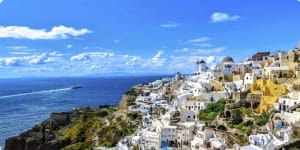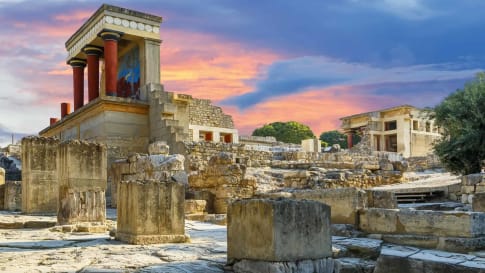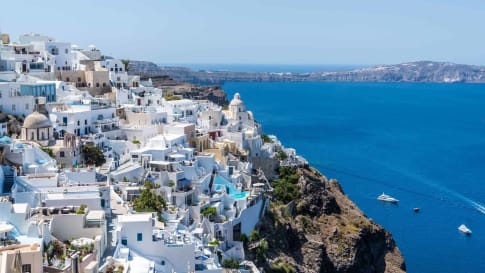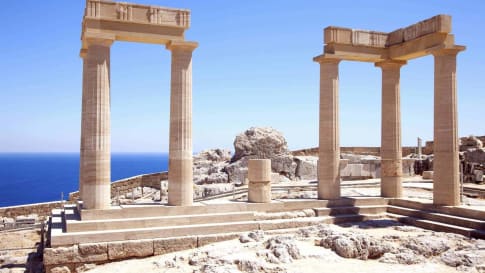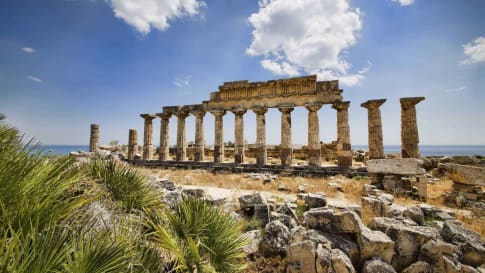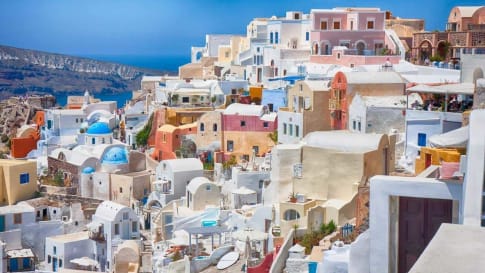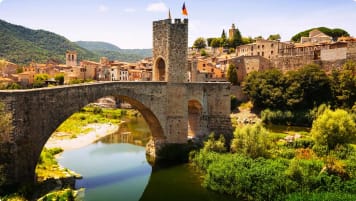Santorini - Crete: Eastern-Mediterranean Islands Short tour
Join our small group short tour of the Eastern Mediterranean. Spend 10 days in Greece for a glimpse of the land of great philosophers, myths, and legends. We will learn about the culture and heritage of modern Greece while travelling from Athens to Santorini and over to Crete.
From A$9,375AUD

Highlights
- 1. Learn about the fascinating history of ancient and modern Greece.
- 2. See amazing ancient remains of magnificent palaces.
- 3. See the sites of Greek mythology.
- 4. Explore Santorini, a remnant of a volcanic era.
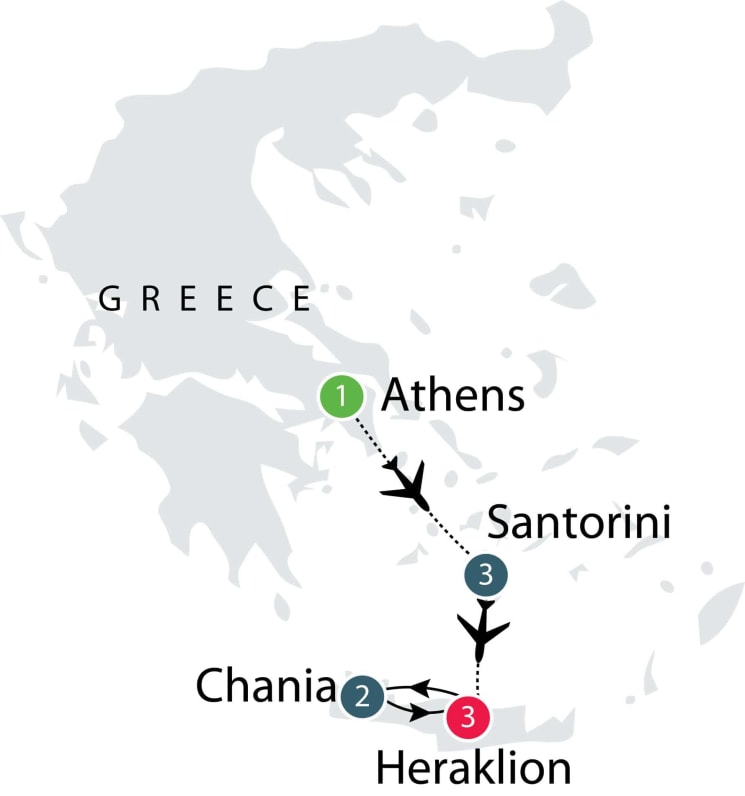
Departure Dates
| Departure Date | Price |
|---|---|
| 24 March 2025 Ends 02 April 2025 • 10 days A$9,375 Twin A$10,680 Single Available | Selected |
| 12 October 2025 Ends 21 October 2025 • 10 days A$9,375 Twin A$10,680 Single Available | |
| 30 March 2026 Ends 08 April 2026 • 10 days A$9,375 Twin A$10,680 Single Available | |
| 11 October 2026 Ends 20 October 2026 • 10 days A$9,375 Twin A$10,680 Single Available |
Eastern Mediterranean Islands short tour
Eastern Mediterranean Islands short tour. During this short tour we experience the immersion of culture and history that the Greek islands have to offer over the course of 10 days. Our educational tour has a limit of 18 people.
While on this small group tour our professional guides join your program leader to share their knowledge as you explore the islands of Greece and learn about the cradle of Western civilization. You visit Santorini, an ancient civilisation destroyed by a volcanic eruption. Subsequently, you travel to Crete with its famous ancient remains of Minoan palaces. Both islands are amazing with their dramatic scenery.
Eastern Mediterranean Islands short tour Itinerary
The Eastern Mediterranean Islands short tour begins in Athens, the home of many ancient archaeological sites. Its atmosphere has a mixture of classical Greek, Byzantine, Ottoman, and modern architecture. Ringed by mountains and conveniently located near Piraeus (its Mediterranean port), Athens epitomises both ancient and modern Greece.
Our next stop on the tour is Santorini, a volcanic island that the Minoans colonised in 3000 BC. The island is possibly the lost kingdom of Atlantis. Originally named Thira by the Dorians in the 8th century BC, it was renamed Santorini in honour of St. Irene by the Venetians who conquered the island in the 13th century. Today, the island remains a stunning example of a Cycladic white washed village, clinging to volcanic cliffs above black sand beaches.
Following Santorini we take a short flight to Crete where we stay for the next five days exploring this amazing rocky island. The island is steeped in history both ancient and modern. Crete is the island where the god Zeus was born and where Theseus fought the Minotaur. It also saw the development of the Minoan civilization remembered particularly for the bull leaping frescoes. Finally you spend time with a local guide exploring the ancient Minoan palaces of Knossos and Phaistos.
The Eastern Mediterranean Islands short tour is for the senior or mature couple or solo traveller curious to learn about the ancient civilisation on Santorini and Crete. You can learn more about Greece with our country profile where all the other tour departures are listed as well. Odyssey Traveller also offers a 21-day long version of the tour, Santorini, Crete & Cyprus Tour.
For more details, click the ‘Top 5’ or ‘Itinerary’ buttons above! If you’re keen to experience this tour, please call or send an email. Or, to book, simply fill in the form on the right hand side of this page.
Gallery


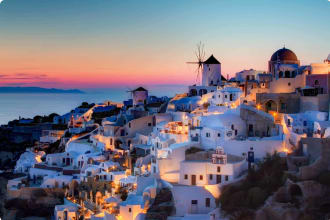
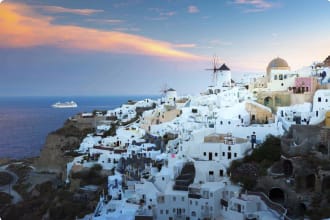
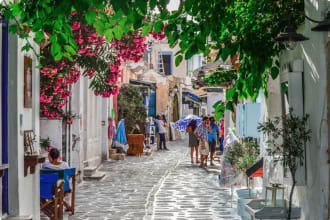

Itinerary
10 days
Day 1: Athens
Accommodation: 1 night at Titania Hotel or similar.
We will begin our tour in Athens, a bustling modern metropolis, home to many of the world’s most famous archaeological sites. The city is a melting-pot of classical Greek, Byzantine, Ottoman, and modern architecture. Ringed by mountains and conveniently located near Piraeus (its Mediterranean port), Athens epitomizes both ancient and modern Greece. Upon arrival in Athens, we will arrive to the hotel individually. We will have a meeting with our tour leader at the hotel, followed by a welcome dinner.
Day 2: Santorini
Accommodation: 3 nights at the El Greco Hotel or similar.
After breakfast we will travel to Santorini. Colonised by the Minoans in 3000 BC, this volcanic island erupted in 1450 BC, forming Santorini’s present distinctive crescent shape. The island is widely believed to be a candidate for the lost kingdom of Atlantis. Originally named Thira by the Dorians in the 8th century BC, it was renamed Santorini in honour of St. Irene by the Venetians who conquered the island in the 13th century. The island remains a stunning example of a Cycladic island with white washed villages, clinging to volcanic cliffs above black sand beaches, best explored when the cruise ships have left.
In the afternoon, we will visit the Prehistoric Museum in Fira, which displays archaeological treasures from Ancient Thera, Akrotiri and Potamos.
Day 3: Santorini
Accommodation: El Greco Hotel or similar.
We will take a morning visit to the town of Oia and lunch at Ammoudi, which is 300 steps below Oia. In the afternoon, we will visit the archaeological site of Akrotiri, which was destroyed by a volcanic eruption circa 1613 BC. Our exploration for the day will end with a visit to the site of Ancient Thera.
Day 4: Santorini
Accommodation: El Greco Hotel or similar.
We will take a walking tour of Fira. We will visit Agios Stylianos, which is a chapel clinging to the edge of a cliff, and we will visit the Frankish Quarter, which features a maze of arcaded streets. We will then take an excursion to the volcanic island of Nea Kameni in the caldera.
In the afternoon, we will visit a winery and explore the fascinating vineyards on Santorini. Because it can get very windy on the island, the residents weave vines into basket shapes low to the ground instead of tying vines to trellises.
Day 5: Heraklion
Accommodation: 3 nights at the Ibis Styles Heraklion or similar
In the morning we will take a coach to the airport and fly across to Heraklion, in Crete. We will arrive in Heraklion, in Crete, and transfer to the hotel. Crete is one of the most beautiful and traditional regions of Greece. Although Cretans have fought generations of invaders, they are a people whose courtesy and hospitality to travelers is legendary.
Day 6: Heraklion
Accommodation: Ibis Styles Heraklion or similar.
In the morning, we will visit Knossos, which was the capital of Minoan Crete. Knossos was inhabited for several thousand years until its destruction in 1375 BC, which marked the end of Minoan civilization. The palace of Knossos was built circa 1900 BC on the ruins of previous settlements. It was destroyed for the first time along with the other Protopalatial palaces around Crete in 1700 BC, probably by a large earthquake or foreign invaders. It was immediately rebuilt to an even more elaborate complex, and until its abandonment was damaged several times during earthquakes, invasions, and in 1450 BC by the colossal volcanic eruption of Thera. A British archaeologist excavated the site in 1900 AD and restored large parts of the palace. According to Greek mythology, the palace was designed by famed architect Dedalos with such complexity that no one inside could ever find its exit. King Minos, who commissioned the palace, then kept the architect prisoner to ensure that he would not reveal the palace plan to anyone. Dedalos, who was a great inventor, built 2 sets of wings so he and his son Ikaros could fly off the island, and so they did. On their way out, Dedalos warned his son not to fly too close to the sun because the wax that held the wings together would melt. However Ikaros, young and impulsive as he was, flew higher and higher until the sun rays dismantled his wings and the young boy fell to his death in the Aegean sea. The palace is also associated with the legend of Theseus killing the Minotaur.
In the aftrnoon, we will visit the Heraklion Archaeological Museum, which is one of the largest and most important museums in Greece. The museum, located in the town centre, was built on a site previously occupied by the Roman Catholic monastery of Saint Francis, which was destroyed by an earthquake in 1856. The museum’s building is an important example of modernist architecture and was awarded a Bauhaus commendation. The museum’s architect, Patroklos Karantinos, applied the principles of modern architecture to the specific needs of a museum by providing good lighting from the skylights above and along the top of the walls, and facilitating the flow of large groups of people. He also anticipated future extensions to the museum. The museum houses representative artifacts from the Neolithic period to the Roman rimes. The museum’s Minoan collection contains unique examples of Minoan art, many of them true masterpieces.
Later we will take a walking tour of Heraklion, including a visit to the Morosi Fountain, the Bembo Fountain, Venetian Loggia, Agios Titos Church, the Koules Fortress (Venetian), and the if time permits we stop at the local Market.
Day 7: Heraklion
Accommodation: Ibis Styles Heraklion or similar.
This morning we will go to the Nikos Kazantzakis Museum, which pays tribute to the important intellectual, author, thinker, philosopher, politician, and traveler, Nikos Kazantzakis, author of “Zorba the Greek.” The museum is made up of a cluster of buildings in the central square of the historical village of Varvari, now known as Myrtia. The museum was founded by set and costume designer Yiorgos Anemoyiannis, a pioneering figure in Greek theatre. His fundamental aim was to preserve the author’s memory and promote his work and thought. Significant assistance was offered by Eleni Kazantzaki, the author’s second wife.
The Museum holds manuscripts and notes by the author; samples of his correspondence with major thinkers, politicians and authors of his time; first editions of his works in Greek and other languages; rare photographic material; souvenirs from his travels; personal effects; models, costumes and other material from theatre productions of his works in Greece and abroad; portraits and sculptures of the author; and dozens of foreign-language editions of his works from all over the world.
We will stop for a wine tasting and lunch. After lunch, we will visit the Minoan Palace of Malia. This is the third-largest Minoan palace in Crete, built in a wonderful setting near the sea on the road linking eastern and central Crete. This palace, which was first constructed circa 1900 BC, was the mythological seat of Minos’s brother Sarpedon. The palace was destroyed and rebuilt numerous times, and today we can walk around the actual palace, just as it was uncovered by archaeological excavations. Most of the ruins visible today belong to the Neopalatial complex – the second palace – whose rooms are set around 3 courts: the Central Court, the North Court and the Tower Court. The majestic size and complex plan of the palace make it a fascinating place to visit.
Day 8: Chania
Accommodation: 2 nights at Hotel Kriti or similar.
We will visit the Minoan Palace at Phaestos. The Palace of Phaestos lies on the east end of Kastri hill at the end of the Mesara plain in Central Southern Crete. To the north lies Psiloritis, the highest mountain in Crete. On the slopes of Psiloritis is the Kamares cave, which was likely a religious or cult centre for Phaestos and the Mesara plain. A very fine pottery style was discovered in this cave from the Middle Minoan period, which has been named Kamares Ware after the cave in which it was found. Kamares Ware has only been found at palace sites like Phaistos and Knossos, suggesting that it was specially produced for whoever was based in the palaces.
A couple of kilometres to the west of Phaistos is the important Minoan site of Ayia Triadha. To the south of Phaistos are the Asterousia mountains beyond which lies the Libyan Sea. To the southwest is Kommos, the ancient port of Phaistos, and to the east, the vast Mesara plain which is the single largest fertile area in Crete and was populated with small settlements and distinctive tholos tombs in Minoan times. We will also visit the mountain village of Zaros which is famous for its natural spring water, and see the Moni Agios Nikolaos at the mouth of the Rouvas Gorge.
Day 9: Chania
Accommodation: Hotel Kriti or similar.
We will take a full day excursion along the west coast. Our first stop will be Rethymo, where we will visit the Venetian fortress and the Old Quarter, including the Rimondi Fountain and the Venetian Loggia.
We will visit Chania to explore Venetian fortifications. We will see the Church of Agios Nikolaos, which the Ottomans converted into a mosque in 1645 until it was returned to an Orthodox Church in 1918. We will also experience the Agora, or covered market. Our final visit for the day will be to the Allied War Cemetery at Souda Bay.
Day 10: Chania
The tour will conclude today after breakfast.
Tour Notes
- Group size is limited to a maximum of 18 participants.
Includes / Excludes
What’s included in our Tour
- 9 nights accommodation.
- Meals as indicated.
- Applicable entry fees and services of local English speaking guides.
- Transport, internal flights and field trips as indicated.
- Touring by comfortable and modern coach.
- Service charges and gratuities.
- Services of an Odyssey tour leader.
- Detailed tour information booklet.
What’s not included in our Tour
- Return international airfare and departure taxes.
- Comprehensive travel insurance.
- Meals not included in the itinerary.
- Items of personal nature like phone calls and laundry.
Participants must be able to carry their own luggage, climb and descend stairs, be in good health, mobile and able to participate in 3-5 hours of physical activity per day, the equivalent of walking / hiking up to 8 kilometers per day on uneven ground.
Book now
Make it a private tour
Easing your journey
Crossing international borders with restrictions
The list of requirements to travel internationally has changed and will continue to change for several years. Odyssey is here to assist you in managing your way through these requirements:
For more information see our Crossing international borders with restrictions page.
Book With Confidence
If less than 30 days before your tour starts you are unable to travel as a result of Government travel restrictions, Odyssey Traveller will assist you with a date change, provide you with a credit or process a refund for your booking less any non-recoverable costs.
See Terms and conditions for details.
Peace of Mind Travel
The safety of our travellers, tour leader, local guide and support staff has always been our top priority and with the new guidelines for public health and safety for keeping safe for destinations around the world, we’ve developed our plan to give you peace of mind when travelling with us.
See Peace of Mind Travel for details.
Reading List Download PDF
Santorini: Volcano, Natural History, Mythology
Walter Friedrich
This is a completely new and revised edition of the best-seller "Fire in the Sea: The Santorini Volcano, Natural History and the Legend of Atlantis" (originally published by Cambridge University Press, 2000). When the Greek island of Santorini, classically known as Thera, dramatically erupted in 1613 BC 13 years, it produced one of the largest explosions ever witnessed, thereby possibly giving rise to the legend of Atlantis. This so-called 'Minoan' eruption triggered tsunamis that devastated coastal settlements in the region. On Santorini it left behind a Bronze Age Pompeii, which is now being excavated. Thriving Bronze Age settlements on the island - rich in colourful wall paintings and highly sophisticated pottery - were buried under thick layers of volcanic ash. The ejection of an immense volume of dust into the atmosphere also altered global climate for several years. The author, a well-known geologist, blends the thrill of scientific discovery with a popular presentation of the geology, archaeology, history, people and the environmental settings of the island group of Santorini. He not only gives a comprehensive overview of the volcanic island and its past, but also reports on the latest discoveries: the finding, for example, of olive trees which had been buried by the Minoan eruption has now made it possible to give a direct and precise radiocarbon date for the volcanic catastrophe. The author also seeks to assign certain geological structures, such as faulted rocks, red lavas and harbour sites, as depicted on the Bronze Age frescos from Santorini, to still-existing details in the Santorini landscape of today. Excellent colour photographs and illustrations along with easily understandable scientific and historic details will make this book highly appealing to a wide audience. It will also be useful as a supplementary text for introductory courses in earth and atmospheric sciences, geology, volcanology, and paleoclimatology, as well as ancient history and archaeology.
The Greek Islands
Lawrence Durrell
As every reader of Durrell knows, his writing is steeped in the living experience of the Mediterranean and especially the islands of Greece. This text weaves together evocative descriptions, history and myth (including flowers and festivals) with his personal reminiscences.
Travels with Epicurus: A Journey to a Greek Island in Search of a Fulfilled Life
Daniel Klein
Advice on achieving a fulfilling old age from one of the bestselling authors of Plato and a Platypus Walk into a Bar . . .
After being advised by his dentist to get tooth implants, Daniel Klein decides to stick with his dentures and instead use the money to make a trip to the Greek island Hydra and discover the secrets of aging happily. Drawing on the inspiring lives of his Greek friends and philosophers ranging from Epicurus to Sartre, Klein uncovers the simple pleasures that are available late in life, as well as the refined pleasures that only a mature mind can fully appreciate.
A travel book, a witty and accessible meditation, and an optimistic guide to living well, Travels with Epicurus is a delightful jaunt to the Aegean and through the terrain of old age that only a free spirit like Klein could lead.
The Islands of the Eastern Mediterranean: A History of Cross-Cultural Encounters
Özlem Çaykent (Editor), Luca Zavagno (Editor)
The Mediterranean, or ‘Middle Sea’, has long been regarded as the symbolic centre of European civilization. The binding water between Turkey, the Middle East, the trading communities of North Africa, and the European powerhouses Italy, France and Greece, a history of this sea is a new and vital way of understanding the history of the societies which have flourished in the region. The Islands of the Eastern Mediterranean charts the story of the water as both connector and border, and analyses the islands role in world history. From Mehmed II’s efforts to conquer the old Roman Empire, through the claims of Rhodes and the role of the Aegean Islands in Ottoman international relations, to the British in Cyprus and the present-day tensions surrounding the region.
Experiencing Dominion: Culture, Identity, and Power in the British Mediterranean
Thomas W. Gallant
Experiencing Dominion pushes contemporary literature on historical anthropology in a new direction by moving the discussion away from an emphasis on a simple polarity between hegemony and resistance, and instead focusing on the shared interactions between colonizers and colonized, rulers and ruled, foreigners and locals. In this important study, Gallant emphasizes contingency and historical agency, examines intentionality, and explores the processes of accommodation and, when warranted, resistance. In so doing, he reconstructs the world Britons and Greeks made together on the Ionian Islands during the nineteenth century through their shared experience of dominion.
Islands of the Eastern Mediterranean (American Geographical Society - Around the World Program)
Jay and Marcia Forman
AmazonThe Eastern Mediterranean and the Making of Global Radicalism, 1860-1914
Ilham Khuri-Makdisi
In this groundbreaking book, Ilham Khuri-Makdisi establishes the existence of a special radical trajectory spanning four continents and linking Beirut, Cairo, and Alexandria between 1860 and 1914. She shows that socialist and anarchist ideas were regularly discussed, disseminated, and reworked among intellectuals, workers, dramatists, Egyptians, Ottoman Syrians, ethnic Italians, Greeks, and many others in these cities. In situating the Middle East within the context of world history, Khuri-Makdisi challenges nationalist and elite narratives of Mediterranean and Middle Eastern history as well as Eurocentric ideas about global radical movements. The book demonstrates that these radical trajectories played a fundamental role in shaping societies throughout the world and offers a powerful rethinking of Ottoman intellectual and social history.
The Collapse of the Eastern Mediterranean: Climate Change and the Decline of the East, 950-1072
Ronnie Ellenblum
As a 'Medieval Warm Period' prevailed in Western Europe during the tenth and eleventh centuries, the eastern Mediterranean region, from the Nile to the Oxus, was suffering from a series of climatic disasters which led to the decline of some of the most important civilisations and cultural centres of the time. This provocative study argues that many well-documented but apparently disparate events - such as recurrent drought and famine in Egypt; mass migrations in the steppes of central Asia; and the decline in population in urban centres such as Baghdad and Constantinople - are connected and should be understood within the broad context of climate change. Drawing on a wealth of textual and archaeological evidence, Ronnie Ellenblum explores the impact of climatic and ecological change across the eastern Mediterranean in this period, to offer a new perspective on why this was a turning point in the history of the Islamic world.
Empires of the Sea: The Final Battle for the Mediterranean, 1521-1580
Roger Crowley
In 1521, Suleiman the Magnificent, Muslim ruler of the Ottoman Empire, dispatched an invasion fleet to the Christian island of Rhodes. This would prove to be the opening shot in an epic clash between rival empires and faiths for control of the Mediterranean and the center of the world. In Empires of the Sea, acclaimed historian Roger Crowley has written a thrilling account of this brutal decades-long battle between Christendom and Islam for the soul of Europe, a fast-paced tale of spiraling intensity that ranges from Istanbul to the Gates of Gibraltar. Crowley conjures up a wild cast of pirates, crusaders, and religious warriors struggling for supremacy and survival in a tale of slavery and galley warfare, desperate bravery and utter brutality. Empires of the Sea is a story of extraordinary color and incident, and provides a crucial context for our own clash of civilisations.
